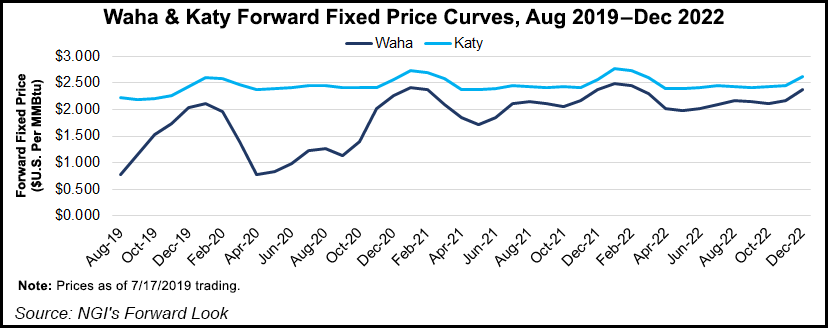Infrastructure | NGI All News Access
Texas Landowners Pivot to ESA to Block 2 Bcf/d Permian Highway
The proposed 42-inch diameter Permian Highway Pipeline, designed to move 2 Bcf/d from the Permian Basin to the Gulf Coast, is facing another assault as plaintiffs prepare to sue the sponsors using the Endangered Species Act (ESA).

Hays County commissioners voted on Tuesday to join other plaintiffs to block the project, which got the green light in June from the Travis County District Court, which crushed a challenge to the pipeline licensing process.*
Hays County joined the Travis Audubon Society and three private plaintiffs in filing a notice of intent (NOI) to sue sponsor Kinder Morgan Inc., the U.S. Army Corps of Engineers and the U.S. Fish and Wildlife Service. Under the ESA, plaintiffs must wait for 60 days to file a lawsuit after filing an NOI.
TREAD, aka the Texas Real Estate Advocacy and Defense Coalition, is funding the pipeline challenges. The coalition said the court challenges “highlight the glaring need for a real oil and gas pipeline routing process in Texas” and “plaintiffs from both suits believe that this lack of transparency denies Texans the process its constitution requires and in doing so, puts at risk the health, safety and economy of its citizens across the state.”
Approval of the project is a “thinly veiled attempt to avoid obtaining the necessary federal permits,” which allows Kinder to “lawfully ”take’ federally listed endangered species during the construction, operation and maintenance of the PHP,” the plaintiffs argue. The ESA prohibits any action that causes a “taking” of any listed species of endangered fish or wildlife.
PHP as designed would cross recharge zones of the Edwards and Edwards-Trinity aquifers, which provides drinking water supplies for more than two million people, as well as habitat for federally listed endangered species that include the golden-cheeked warbler.
The endangered warbler has an estimated population of around 27,000 in the wild. It nests in dense juniper woodlands of the Texas Hill Country, but it winters in the jungles of Mexico, Guatemala, Honduras and Nicaragua.
The Hays County Commission also voted Tuesday to appeal the Travis County District Court’s ruling. The City of Kyle, another plaintiff in the case, voted earlier this month to appeal the lawsuit.
Plaintiffs want an environmental impact study conducted under the National Environmental Policy Act (NEPA). The Army Corps said PHP sponsors plan to use the Nationwide Permitting verification process instead.
“One distinct difference between NEPA and the Nationwide Permitting processes is the requirement to consider alternative routes,” the plaintiffs said. “Typically, a project of this scale would require a full NEPA review.”
Plaintiffs attorney David P. Smith said, “It is our hope that Kinder Morgan will do the sensible thing and comply with federal law, which could obviate the need for a lawsuit to be filed.”
The chosen route for PHP impacts the fewest number of landowners, according to Kinder, and the company plans to protect environmentally sensitive areas.
“We feel confident that the Travis County District Court ruled in accordance with settled law, and we continue to work with all stakeholders, including state and federal regulators, as we complete the Permian Highway Pipeline,” the company said. “We are also complying with all applicable laws related to endangered species along the pipeline route.”
*Correction: In the original article, NGI incorrectly stated that the Railroad Commission of Texas allows pipeline operators to determine the route and acquire land without a landowner’s consent. The state law is enacted by the Texas Legislature. Additionally, the Railroad Commission has no authority over the routing or siting of intrastate or interstate pipelines. The pipeline route is determined by the pipeline’s owner/operator. NGI regrets the error.
© 2024 Natural Gas Intelligence. All rights reserved.
ISSN © 1532-1231 | ISSN © 2577-9877 |
